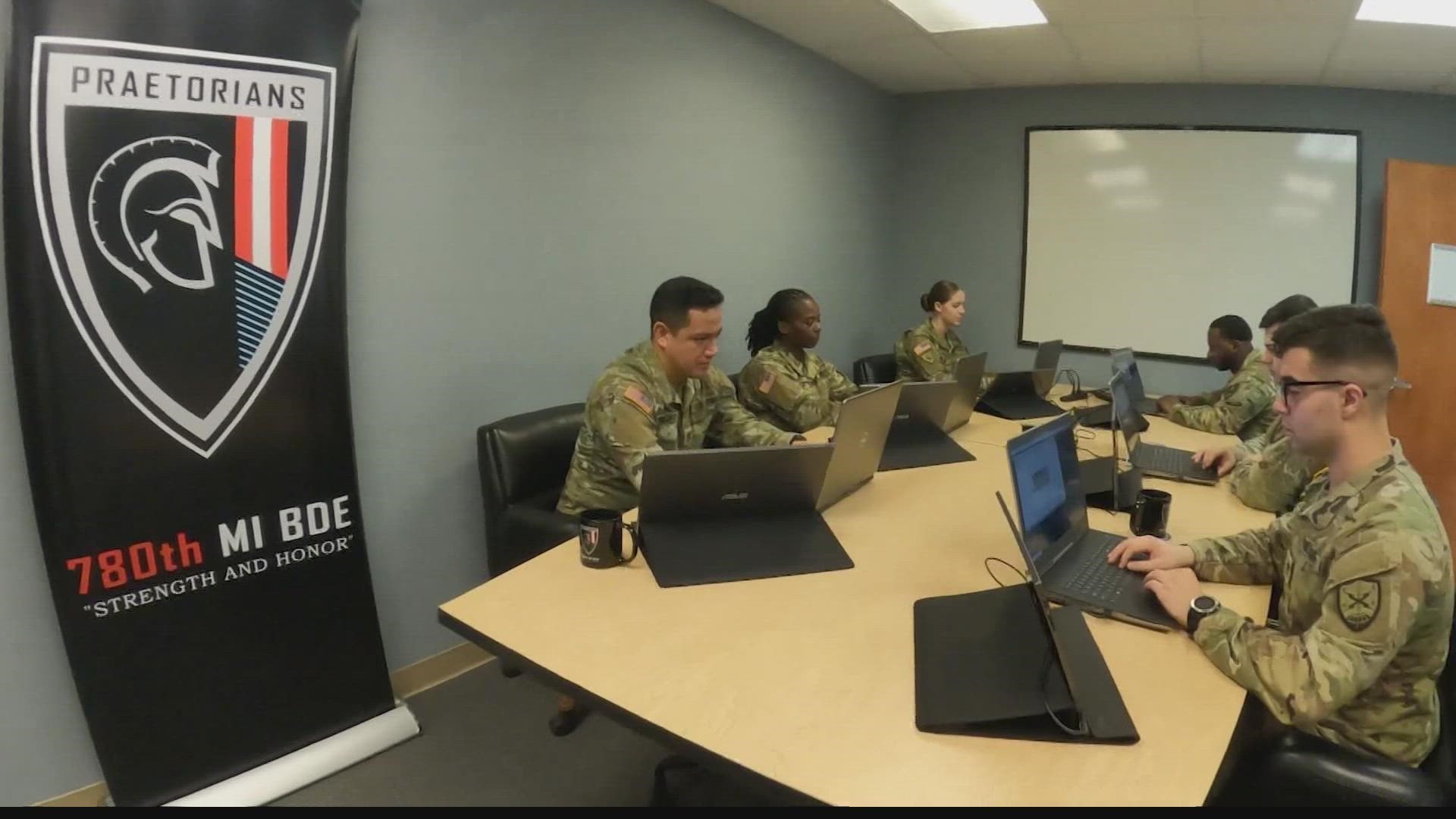FORT MEADE, Md. — The fight is no longer limited to automatic rifles and machine guns. The modern-day soldier who volunteers with the Army National Guard is engaged in another battlefield, using a different weapon more than 500 miles from Indiana.
Not far from Inner Harbor in Baltimore, Maryland, is Fort Meade. That's where Hoosiers are fighting a growing threat: cyberattacks.
"Everything my soldiers do from this building is in direct support of national security," said LTC Rose Gilroy of the 127th Cyber Protection Battalion. "We are comprised of approximately 95 soldiers. We have a defensive team. We have an offensive team."
Gilroy said the organization was created in October 2020 and came to Fort Meade in September 2021.
"We provide the support to the 780th Military Intelligence Brigade cyber in regard to all the infrastructure that's required for offensive and defensive cyber operations," Gilroy said.
Gilroy said the 127th Cyber Protection Battalion is similar to what people do within the civilian sector in cyber technical roles and responsibilities.
RELATED: FBI: Cyberattacks target farmer co-ops during planting season. Here are tips to remain cyber secure
"Everything from defensive of cyber operations to providing support to actual offensive operations," Gilroy said. "Anything from ransomware to people trying to steal data or sensitive information."
They're doing it one keystroke at a time.
The 13News crew was not allowed inside the secret building at Fort Meade, but met Indiana members of the 127th Cyber Protection Battalion in a different facility.

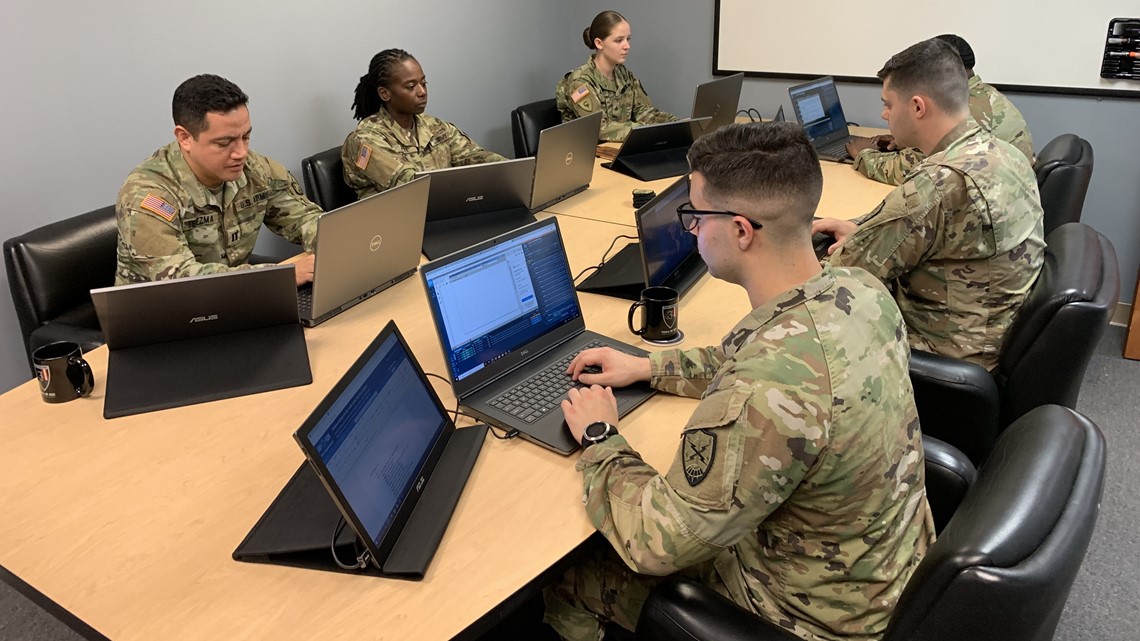
Computer knowledge is part of their DNA.
"A lot of my friends would characterize me as a computer nerd," said Robert Barringer.
"It's probably the stereotypical thing that everybody thinks about when you think of cyber — somebody sitting behind a computer, probably full of energy drinks," Christina Peete said.
Many of the cyber-soldiers use similar skills in their civilian jobs. But on this mission, they are helping protect the homeland from cyberattacks.
"There's always people trying to get into your systems and either disrupt your operations or steal your information," Valentin Ledezma said.
A specialized training center
13News joined Indiana Adjutant General Dale Lyles on a Black Hawk helicopter and flew to Jennings County in southern Indiana. The destination was a place very few Hoosiers have ever seen before: Muscatatuck Urban Training Center, where the Army trains.

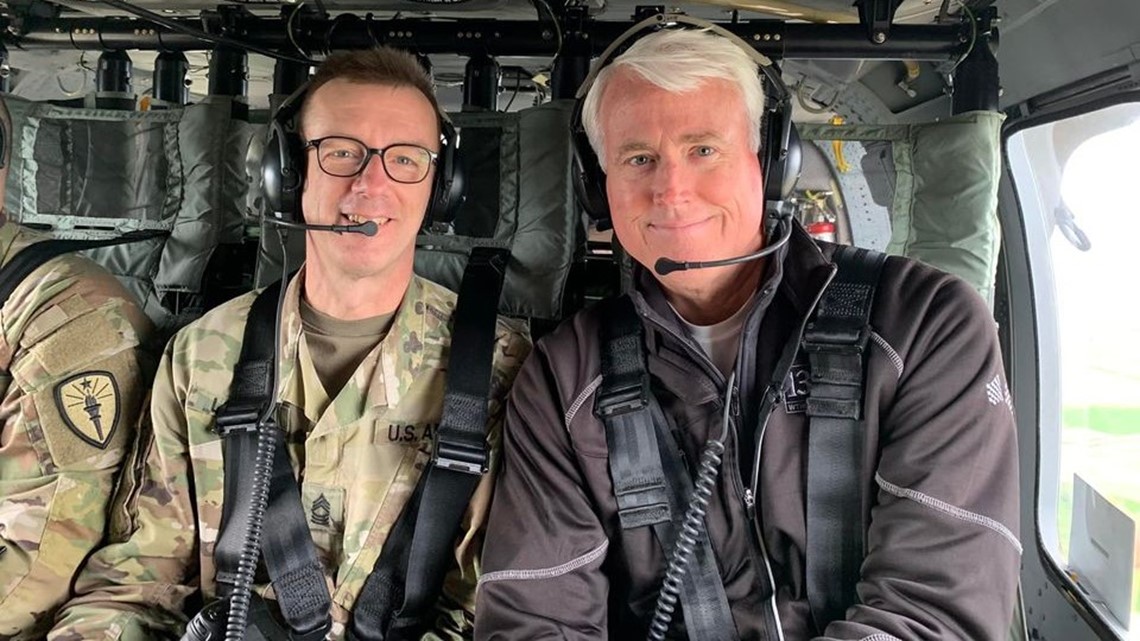
"Muscatatuck is over 1,000 acres of an urban training center that provides the services, specifically the Army and other services, to train in multi-domain operations," Lyles said. "Multi-domain operations is the new Army doctrine that we're training in, which consists of land, air, sea, cyber and space. Muscatatuck offers the ability to train simultaneously in all those spaces."
In addition to the military, civilian cybersecurity professionals in state government also train at Muscatatuck. Lyles said they are looking at ways to partner with private businesses, too. The adjutant general led a tour of the complex, which included the cyber range operations center.
"It's the brain of the cyber," Lyles said.
Tim Koharchick, the program manager at Muscatatuck, said training runs through a single building on the grounds.
"Wet set the conditions for standards and units for customers to come and conduct testing and training that reaches their objects," Koharchick said.
The Indiana National Guard trains at Muscatatuck to protect the U.S. against frequent, foreign cyberattacks.
"Our adversaries are using cyber to attack daily, especially China and Russia," Lyles said. "The United States is well equipped to defend against those attacks. We've done quite well, specifically against Russia recently. We expected a lot of cyberattacks when they invaded Ukraine. We haven't seen those as relevant as we thought they would be because we're doing a good job of defending against those."
But foreign militaries aren't the only threat. Lyles said private organizations are also attacking systems, then holding victims ransom — asking for payment to reverse the attack and restore the system.
Those threats can come from shantytowns anywhere in the world. So, cyber-soldiers train in a similar setting at Muscatatuck.
The sprawling complex allows training in a variety of settings.
Urban training
"We have everything from the land component in how to fight in an urban environment, as well as the cyber domain that lays on top of that," Lyles said. "The critical infrastructure is in our water treatment plant, our steam plant, our jail, railroad crossings, stoplights. All those things are set up on the internet to allow units to come in to defend or attack."
The land component looks like something out of a war zone. It's called the Urban Core. The fire, smoke and rubble are all intentional. The training center can change the conditions based on the training objectives, so trucks and rubble piles can be moved into different locations.
"This reminds me of Kabul, Afghanistan," Lyles said. "It replicates the core of any municipal or any large city."
In real life, shantytowns are frequently adjacent to urban centers. That's replicated at Muscatatuck.
Cellphone and internet signals are transmitted from the area. Lyles said the Indiana National Guard has a partnership with Crane Naval Warfare Center, which can perform GPS jamming — or blocking of those signals — if necessary.
"This [Muscatatuck] offers the venue to train in a realistic environment that actually prepares you to go overseas and do your mission in a much more capable manner," Lyles said.
The water plant at Muscatatuck has been upgraded since being built in the 1930s.
"It's the same kind of system you'd see throughout the United States, as well as foreign countries. Because of the age of Muscatatuck, and the age of most systems, this replicates most of what you'd see in water treatment plants," Lyles said.
Cyber-soldiers are among those who learn how to protect a water treatment plant from an attack that could disrupt entire communities.
According to Koharchick, the program manager, a 2016 study showed a community going three days with no water would be almost as catastrophic as having no power.
"Twenty-five years ago, when these systems were brought online, cybersecurity wasn't really a thought," Koharchick said. "Now, we've got to go back and look at how can we better protect the water sector."
Lyles also showed the 13News crew the Muscatatuck Urban Training Center subway station — the only subway station in the state of Indiana. Subways and cars present a unique challenge for first responders and military.
"Imagine if you had a chemical, biological, or some other toxin, or smoke or other catastrophe in a subway station. Getting access into the subway system and then securing it, and then helping to get people out to a hospital is extremely difficult in an urban environment," Lyles said.
Training at the jail on campus could prevent a mass prison break.
"You see some of these cameras?" Lyles said. "An attacker will get control of this facility and then will threaten to open all of the doors and allow all of the inmates to come out of the prison if we don't pay the ransom by 5 o'clock on Friday."
But training isn't always about protecting against attacks. Cyber-soldiers are also learning to go on the offensive.
"The cyber warriors can attack and get the keypad, unlock the doors, and allow the soldiers to go in make their rescue," Lyles said.
Joining the cyber battalion
Anyone interested in becoming a cyber-soldier in the Indiana National Guard doesn't have to make a life-changing commitment to do so.
"You can do this one weekend a month, two weeks a year, and then you can go back to your cybersecurity profession and do that through the week," Lyles said. "The Indiana National Guard offers the ability to be in a cyber battalion, be a cyber-warrior, train here, get all the credentials, all the professional training that you would need to be a very productive cybersecurity specialist in the private sector."
Gilroy said the guard can provide additional training, and anybody with interests in STEM, programming and gaming could be a good fit. You must be at least 18 years old to join. Some cyber-technical experience is preferred.
Meet Indiana's cyber battalion team
Lt. Col. Rose Gilroy

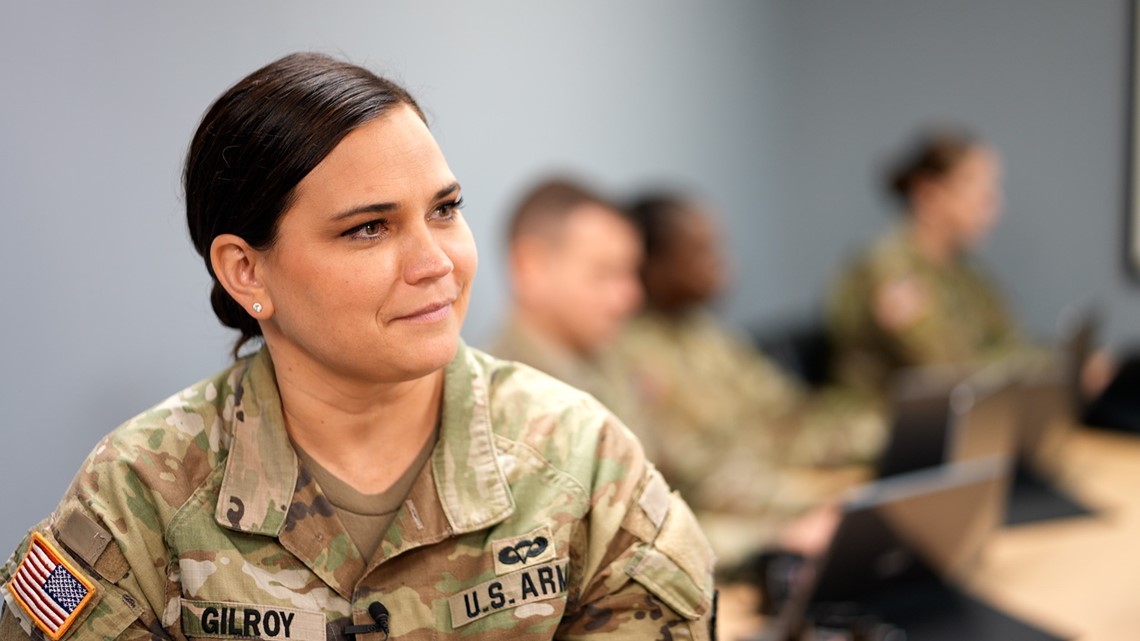
Lt. Col. Rose Gilroy is the battalion commander for the 127th Cyber Protection Battalion. She works full time for the Indiana National Guard.
"We protect the infrastructure. We provide all the support that is required to the operators doing their daily missions that are protecting and serving our national interests," Gilroy said.
Within the state, Gilroy said the governor calls her battalion up at any time.
"We are able to go look at vulnerabilities and make some assessments for any kind of infrastructure that the governor is requesting," Gilroy said. "We're focused on making sure we can fight and defend within the cyber domain. We want to protect against any kind of infiltration from those adversaries into our systems. As a cyber battalion, our weapon system are the computers."
Capt. Christina Peete

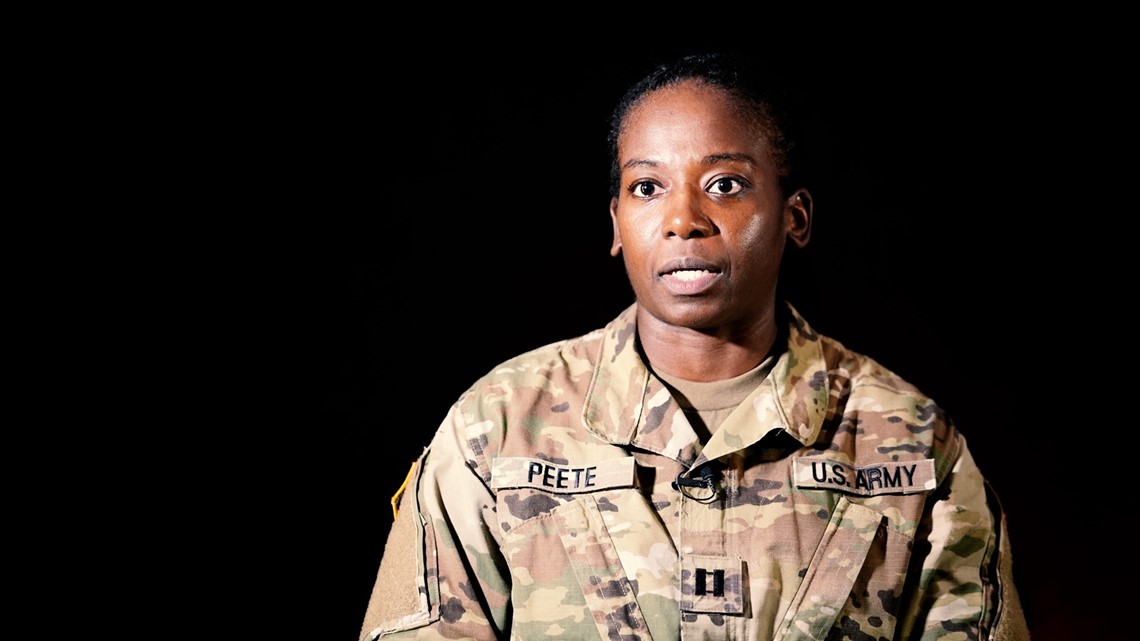
Christina Peete is from Merrillville. She went to Purdue Northwest, then got a graduate degree in cyber security and information insurance at WGU. Initially, she pursued the Guard for a different reason.
"I always thought the Indiana National Guard would allow me to jump out of helicopters, go on obstacle courses, all of that stuff," Peete said.
Peete's first assignment on the Indiana National Guard was being a signal officer. She is now a team lead on the 127th Cyber Protection Battalion.
"You have to have a stable and baseline background in information technology," Peete said. "I lead a bunch of cyber analysts in detection and identification and incident response actions. I see myself having a career after this because of cyber."
Sgt. Brianna Keilly


Brianna Keilly is originally from Terre Haute. Her family moved to Plainfield, where she graduated from high school before earning a degree in informatics from Indiana University.
"We're not out with M4s shooting anyone," Keilly said. "For us, it's making sure the cyberspace is safe. If you're a bank, there's people trying to take credit card numbers. If you're the military, people are going to try to come in and steal information."
Keilly said she never gets bored in her role as she's constantly learning, developing skills and solving problems.
Capt. Valentin Ledezma

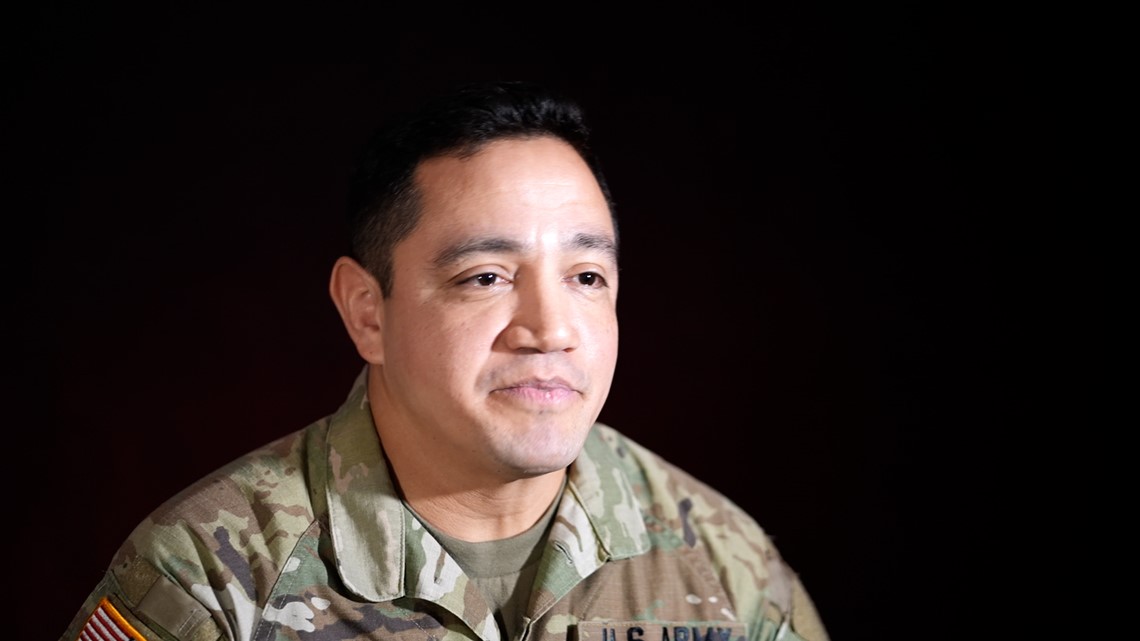
Valentin Ledezma grew up in Indiana and is a graduate of Purdue University. He's married with three kids and as a civilian, works as a defense contractor with Raytheon.
When Ledezma came out of high school, he went to the Air Force Academy but then dropped out. At 34, he joined the National Guard and explained his role in project management with the cyber battalion.
"You're protecting information. You're gathering information. You're manipulating information. We collect intelligence, surveillance, reconnaissance," Ledezma said. "Understanding how to use fires — whether it's artillery or now for us, fires could be cyber-effects that you put downrange — can really affect what the troops are going to do on the ground," Ledezma said.
1st Lt. Robert Barringer

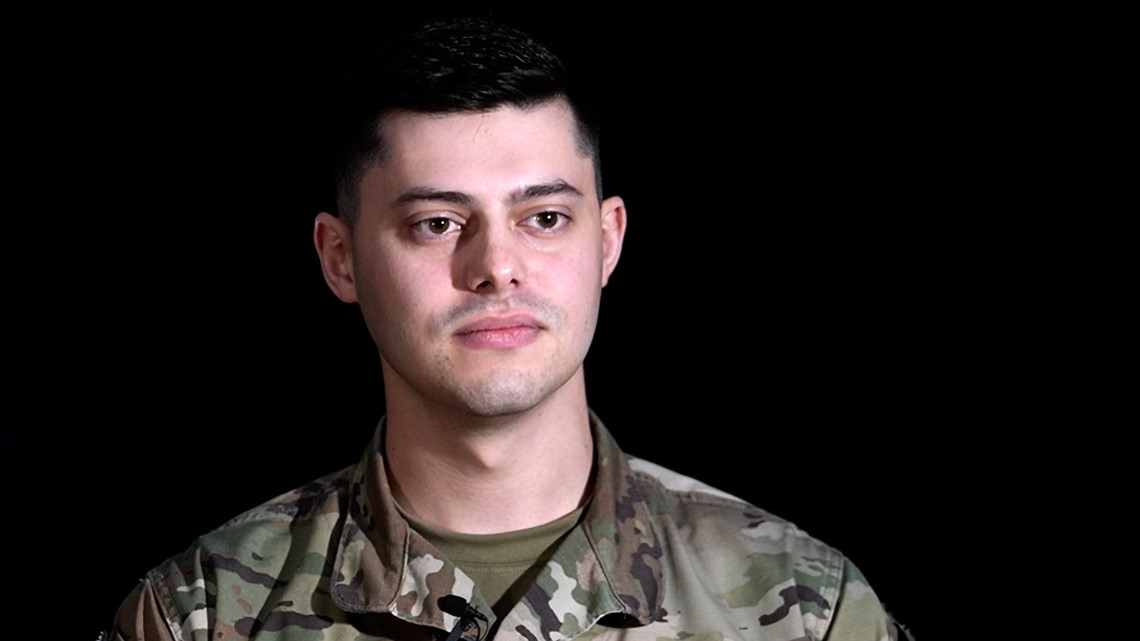
Robert Barringer graduated from Purdue in 2019. He studied cyber security and is now an assistant administrator, working with information and operations systems, making sure things are up to date and patched.
"We have to make sure our systems are secure," Barringer said. "We have to maintain our own readiness and defenses to ensure that they don't have the opportunity to capitalize on those potential vulnerabilities."
Staff Sgt. Dylan Beghtel


Dylan Beghtel is from Fort Wayne and attended Purdue. He's been in the military six years and works as a system administrator.
"I do not have a computer background. I didn't work in IT until arriving at this unit," Beghtel said. "You learn something new every day."
Capt. Al Houssein Bah


Al Houssein Bah is originally from Guinea, West Africa, and moved to Indianapolis when he was 12. Bah attended Crispus Attucks High School and then IUPUI before joining the National Guard.
"Coming in, people are very smart. They had all these certifications that I didn't have. I'm not an information retainer. I like to figure out things," Bah said. "Some people have 50 certifications. The opportunity to work at a high level and working in a cyber environment helps me advance in my civilian career as well."
Bah is the assistant admin officer in charge of the battalion.
"We provide any user support for both offensive and defensive operations in support of national security," Bah said.
Bah's civilian job is a security operations center analyst with hurricane labs. He said his experiences in the battalion could advance his civilian career.

